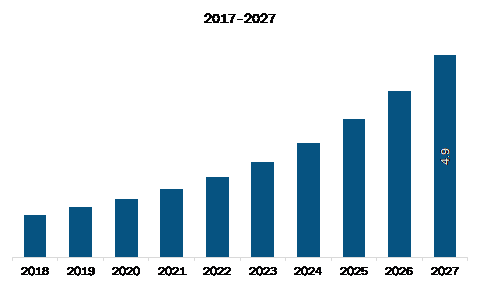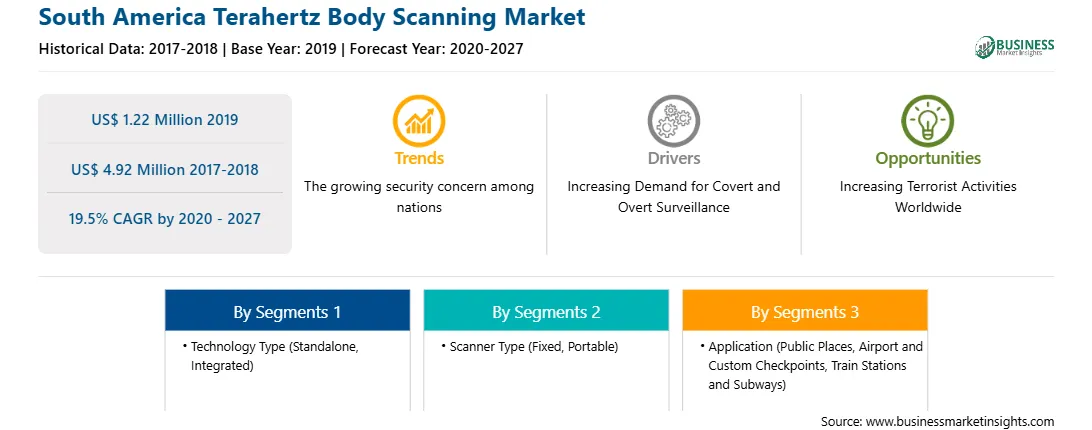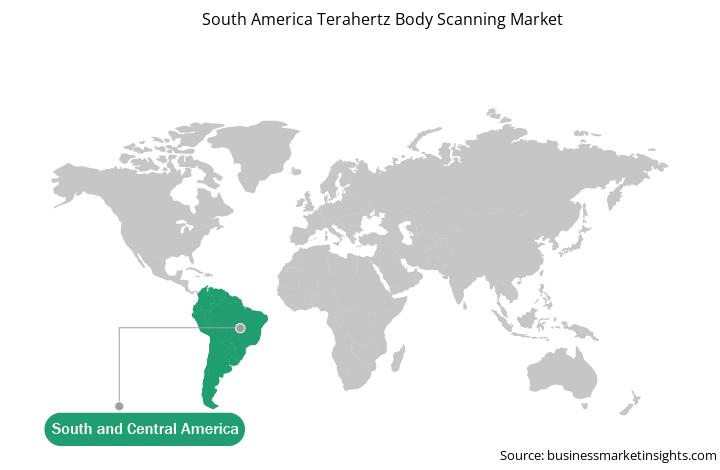A terahertz body scanner is a detector used for detecting hidden objects, such as weapons and other illegal items, underneath a person’s clothing using terahertz radiations. The scanning element directs the radiation on a sensor during terahertz body scanning, and a consolidated image is generated after an imaging processor communicates with the sensor. The scanning technology can be used or integrated into broader security architectures as a standalone security system. These scanners quickly and safely capture images with the help of a non-invasive screening process. Multiple scanning is also possible as the scanners can be used for up to a distance of 10 m, thereby ensuring maximum security without gender-specific screenings. Increasing demand for accurate security systems to filter drugs, weapons, explosives, and other similar threats in global security applications for defence, custom, and airport is a major driving factor of the terahertz body scanner market. As it can detect natural radiation without emissions, the terahertz body scanner is safer than other concealed-item detectors. The terahertz body scanner also blurs intimate areas of the body to maintain public privacy and thus eliminate any government duties on the product. Thus, with need of having a robust security system to counter terror activities the demand for terahertz body scanner is expected to flourish in forth coming future.

Strategic insights for the South America Terahertz Body Scanning provides data-driven analysis of the industry landscape, including current trends, key players, and regional nuances. These insights offer actionable recommendations, enabling readers to differentiate themselves from competitors by identifying untapped segments or developing unique value propositions. Leveraging data analytics, these insights help industry players anticipate the market shifts, whether investors, manufacturers, or other stakeholders. A future-oriented perspective is essential, helping stakeholders anticipate market shifts and position themselves for long-term success in this dynamic region. Ultimately, effective strategic insights empower readers to make informed decisions that drive profitability and achieve their business objectives within the market.

| Report Attribute | Details |
|---|---|
| Market size in 2019 | US$ 1.22 Million |
| Market Size by 2027 | US$ 4.92 Million |
| Global CAGR (2020 - 2027) | 19.5% |
| Historical Data | 2017-2018 |
| Forecast period | 2020-2027 |
| Segments Covered |
By Technology Type
|
| Regions and Countries Covered | South and Central America
|
| Market leaders and key company profiles |
The geographic scope of the South America Terahertz Body Scanning refers to the specific areas in which a business operates and competes. Understanding local distinctions, such as diverse consumer preferences (e.g., demand for specific plug types or battery backup durations), varying economic conditions, and regulatory environments, is crucial for tailoring strategies to specific markets. Businesses can expand their reach by identifying underserved areas or adapting their offerings to meet local demands. A clear market focus allows for more effective resource allocation, targeted marketing campaigns, and better positioning against local competitors, ultimately driving growth in those targeted areas.

The terahertz body scanning market in South America is expected to grow from US$ 1.22 million in 2019 to US$ 4.92 million by 2027; it is estimated to grow at a CAGR of 19.5% from 2020 to 2027. Terahertz imaging systems and techniques have been developed recently and are widely used owing to the advantages of low radiation and clothing-penetrable for detecting concealed weapons or other contraband at airports, customs, retail, and other secure locations. If mounted in a proper enclosure, the body scanner allows the operator to screen people with no knowledge of stealth. This ensures that various person-borne threats are detected effectively without creating chaos. It helps the operator to effectively counter urban violence and prevent street crimes by discovering hidden knives, brass knuckles, and handguns when installed in public places, event arenas, and high profile venues. The enclosed body scanners can be installed at building entrances, secure areas, and other sites with a high throughput capacity.
Besides, the sufficient imaging distance of up to 3 m ensures remote detection of suspicious objects hidden beneath clothes. Thus, covert and overt surveillance is one of the major factors likely to drive the growth of South America terahertz body scanning market.
In the South America region, Brazil has the highest number of COVID-19 confirmed cases, followed by Ecuador, Peru, Chile, and Argentina. The governments of various countries in South America are taking several initiatives to protect people and to contain COVID-19’s spread in the region through lockdowns, trade bans, and travel restrictions. These measures are expected to have a direct impact on the region’s economic growth as the region will face lower export revenues, both from the drop in commodity prices and reduction in export volumes. The presence of various developing nations makes South America as one of the major market for the growth of terahertz body scanning market over the forecast period of 2020 to 2027. However, the sharp decline in manufacturing activities in this region due to COVID-19 lockdown measures is expected to directly impact the growth of terahertz body scanning market in the coming quarters. In addition to this, the supply chain disruptions and non-availability of raw materials will also aggravate the problems of various industries operating in this region. Hence, the decline in business operations and product development activities is expected to directly affect the growth rate of South America terahertz body scanning market in this region for the next three to four quarters.
In terms of technology type, the standalone accounted for the largest share of the South America terahertz body scanning market in 2019. In terms of scanner type, the fixed segment held a larger market share of the South America terahertz body scanning market in 2019. Further, the airports and customs checkpoints segment held a larger share of the market based on application in 2019.
A few major primary and secondary sources referred to for preparing this report on the terahertz body scanning market in South America are company websites, annual reports, financial reports, national government documents, and statistical database, among others. Major companies listed in the report are Terasense Group Inc., Shanghai Eastimage Equipment Co., Ltd., Nuctech Company Limited, and Rohde & Schwarz GmbH & Co. KG. and others.
The List of Companies - South America Terahertz Body Scanning Market
The South America Terahertz Body Scanning Market is valued at US$ 1.22 Million in 2019, it is projected to reach US$ 4.92 Million by 2027.
As per our report South America Terahertz Body Scanning Market, the market size is valued at US$ 1.22 Million in 2019, projecting it to reach US$ 4.92 Million by 2027. This translates to a CAGR of approximately 19.5% during the forecast period.
The South America Terahertz Body Scanning Market report typically cover these key segments-
The historic period, base year, and forecast period can vary slightly depending on the specific market research report. However, for the South America Terahertz Body Scanning Market report:
The South America Terahertz Body Scanning Market is populated by several key players, each contributing to its growth and innovation. Some of the major players include:
The South America Terahertz Body Scanning Market report is valuable for diverse stakeholders, including:
Essentially, anyone involved in or considering involvement in the South America Terahertz Body Scanning Market value chain can benefit from the information contained in a comprehensive market report.